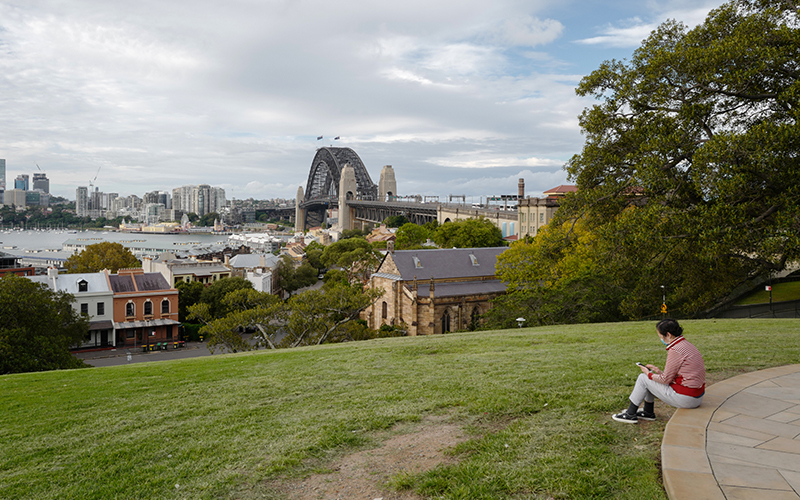
Places like Observatory Hill in Sydney, Australia, are nearly empty as the country’s residents have been told not leave their homes for non-essential purposes, and that includes going to parks and playgrounds. (Photo by James D. Morgan/Getty Images)
TEMPE – Americans continue to live in a world without sports, open restaurants, bars and most stores. Many states have enacted lengthy stay-at-home orders in an effort to slow the spread of the deadly coronavirus, but people are still permitted to go outside and get exercise as long as they practice safe social-distancing.
Those living in some other countries aren’t as lucky.
In a recent live webinar titled “Around the World: COVID-19 + Sport,” sponsored by Arizona State University’s Global Sport Institute, eight panelists representing different countries convened to share what going through this pandemic has been like for citizens and sport as a whole in their respective nations.
Simon Chadwick, director of Eurasian Sport at Emlyon Business School and representing most of the area between Britain and Tokyo, shared the incredibly strict rules Chinese citizens have been living under.
When the country loosened restrictions in late March, it was significant, Chadwick said, “because for the first time since the lockdown began, the Chinese government gave people permission to do very simple things like go to a park and kick a ball.
“The political decision-making process and the structure of government and the culture of engaging with government is very different in China to, say, the United States or Britain. In other words, (if) the government said, ‘Don’t kick a ball in the park,’ ‘OK, that’s it, we’re not going to kick a ball in the park.'”
It’s not surprising. According to a report by the World Health Organization, the virus had taken the lives of 3,349 people in China as of April 12.
Australia has taken its precautions one step further, involving local law enforcement when citizens attempt to leave their homes for non-essential purposes, and that includes going to parks and playgrounds.
“We’ve essentially entered a shutdown mode as well,” said Tracey Holmes, an Australian journalist and presenter on ABC News Radio. “Unless you’re going out to work, unless you’re going out to buy goods that you need, or to help somebody who may have a medical situation, the advice is that you stay at home.
“And it’s a little bit more than advice, because people have already been pulled over by police, and if they don’t have what the police consider at that time to be a valid reason to be out of your home, you’re issued with, on the spot, $1,000 fines. The potential is for those fines to be bigger, and there’s also potential for six months in prison.”
Holmes was based out of Sydney, in the state of New South Wales, at the time of the conference, and noted that Australian Prime Minister Scott Morrison has been making efforts to coordinate the response on a national level. To this point, the individual states have enacted “slightly different” response measures.
For U.S. sports fans, when historians look back, March 11, 2020, will be the date they mention as to when the coronavirus became real for those who love watching competitions.
The full potential of the quickly spreading disease had not yet been realized in the U.S., although there was already talk of measures needed to help “flatten the curve.”
The NBA was the first domino to fall. At 6:31 p.m. PDT, ESPN Insider Adrian Wojnarowski tweeted six words that shook the sports world to its core: “The NBA has suspended the season.”
Fans would later learn the league made its decision after it was informed that Utah Jazz center Rudy Gobert had tested positive for the virus. The Jazz’s game against the Oklahoma City Thunder was immediately canceled and both teams were instructed to remain under quarantine in Chesapeake Energy Arena, the Thunder’s home arena.
The next day MLB and the NHL followed suit, suspending spring training and the remainder of the season, respectively. On March 16, Commissioner Rob Manfred delayed the MLB regular season indefinitely.
The NFL has a plan in place to conduct a completely virtual draft later this month with team officials making their selections from the comfort of their living room couch.
Where, then, can people turn to get their sports fix during this global shutdown? The four major sports leagues in the U.S. – the NBA, NFL, NHL, MLB – have made their streaming services free to allow fans access to games from past seasons, but that simply isn’t enough for those who follow the leagues closely and, for the most part, already know what happens during these games.
One avenue worth exploring, said Stephen Ross, director for Penn State Institute for Sports Law, Policy and Research, is a crossover of the most popular sports between countries. If Americans were granted access to see the entire last year of the Australian Football League season, it could give them the opportunity to learn about an entirely new sports league, as well as give them the chance to watch a sport where they don’t immediately know the conclusion.
“Except for maybe a few hardcore people in the Grand Final, no one in the United States, if they don’t Google the result, will possibly remember who won the Collingwood-Essendon match from last year, and we can watch it and learn,” Ross said. “Likewise, I bet there are a lot of Australians who probably don’t remember what happened in every NBA game or Major League Baseball game last year.”
These are unprecedented times, and for the sports fans in the U.S. and around the world, it will take some creativity and innovation to get as close to live sports as we can while we await the return of the real thing.
